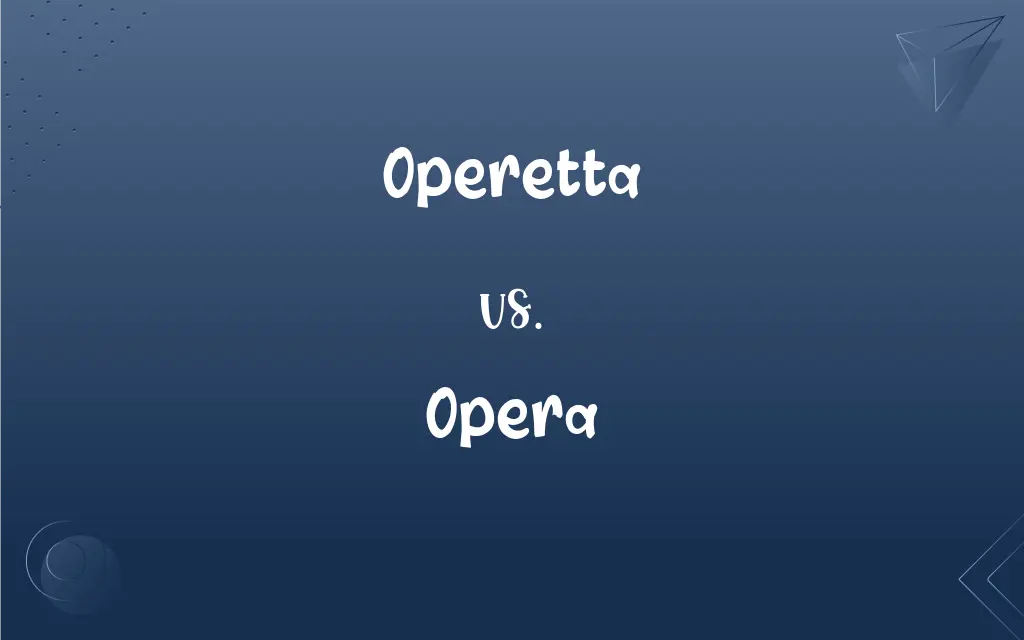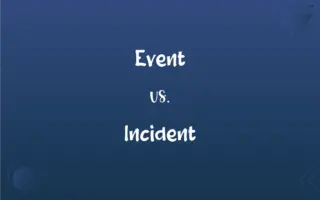Operetta vs. Opera: What's the Difference?
By Janet White & Harlon Moss || Updated on May 28, 2024
Operetta is a light, humorous form of opera with spoken dialogue, while opera is a more serious, fully sung theatrical work with complex music and drama.

Key Differences
Operetta, a lighter form of opera, often blends elements of musical theater with classical opera. It features catchy melodies, light-hearted themes, and spoken dialogue between musical numbers. Operettas are typically shorter and less intense than traditional operas, making them more accessible to a general audience. Opera, in contrast, is a serious, fully sung dramatic work that integrates complex orchestration, vocal performance, and theatrical elements. Operas usually focus on grand themes such as love, tragedy, and historical events.
While operettas emphasize entertainment with their lighter, more humorous content, operas aim for profound artistic expression and emotional impact. The music in operetta is generally simpler and more tuneful, whereas opera music is intricate and demands greater technical proficiency from singers and musicians.
In performance style, operettas typically have a faster pace and include spoken lines that help move the story along. On the other hand, operas are more continuous, with recitative and arias driving the narrative without spoken dialogue.
Operettas often appeal to audiences looking for light entertainment and humor, while operas attract those seeking a deeper, more immersive artistic experience. Both forms play significant roles in the world of musical theater but cater to different tastes and expectations.
Comparison Chart
Definition
Light, humorous form of opera with spoken dialogue
Fully sung, serious dramatic work
ADVERTISEMENT
Themes
Light-hearted, often humorous or satirical
Grand, serious themes like love and tragedy
Music Complexity
Simpler, catchy melodies
Complex, demanding music
Length
Typically shorter
Usually longer
Dialogue
Includes spoken dialogue
No spoken dialogue, continuous singing
Example Composers
Johann Strauss II, Gilbert and Sullivan
Giuseppe Verdi, Richard Wagner
ADVERTISEMENT
Audience Appeal
General audience, light entertainment
Audiences seeking profound artistic expression
Operetta and Opera Definitions
Operetta
A short, light, and often humorous theatrical work that includes both singing and spoken dialogue.
We enjoyed the operetta's witty dialogue and catchy songs.
Opera
A narrative-driven musical work, often based on historical or mythical stories.
The opera depicted the tragic love story of the protagonists.
Operetta
A form of musical theater that blends classical music with light entertainment.
The operetta featured a delightful mix of comedy and music.
Opera
A serious, fully sung dramatic work combining music, singing, and theater.
The opera's powerful arias moved the audience to tears.
Operetta
A performance characterized by its playful, often satirical nature.
The operetta's satire on societal norms had the audience laughing throughout.
Opera
A genre of classical music known for its complexity and emotional depth.
Attending the opera was a profound cultural experience.
Operetta
A genre of opera with a lighter, more accessible style.
Operettas are a great introduction to classical music for newcomers.
Opera
A form of performance art that requires high levels of vocal and instrumental skill.
Performing in an opera demands rigorous training and talent.
Operetta
A theatrical production that prioritizes entertainment and humor over serious themes.
The operetta's charming story and upbeat music made for an enjoyable evening.
Opera
A theatrical production with continuous singing and orchestration.
The opera's seamless blend of music and drama was mesmerizing.
Operetta
A theatrical production that has many of the musical elements of opera but is lighter and more popular in subject and style and contains spoken dialogue. Also called light opera.
Opera
A theatrical presentation in which a dramatic performance is set to music.
Operetta
(music) A lighter version of opera with a frivolous story and spoken dialogue. 18
Opera
The score of such a work.
Operetta
A short, light, musical drama.
Opera
A theater designed primarily for operas.
Operetta
A short amusing opera
Opera
A plural of opus.
Opera
A creative work, especially a musical composition numbered to designate the order of a composer's works.
Opera
(music) A theatrical work, combining drama, music, song and sometimes dance.
Opera
(music) The score for such a work.
Opera
A building designed for the performance of such works; an opera house.
Opera
A company dedicated to performing such works.
Opera
(by extension) Any showy, melodramatic or unrealistic production resembling an opera.
Opera
Plural of opus; a collection of work.
Opera
A drama, either tragic or comic, of which music forms an essential part; a drama wholly or mostly sung, consisting of recitative, arias, choruses, duets, trios, etc., with orchestral accompaniment, preludes, and interludes, together with appropriate costumes, scenery, and action; a lyric drama.
Opera
The score of a musical drama, either written or in print; a play set to music.
Opera
The house where operas are exhibited.
Opera
A drama set to music; consists of singing with orchestral accompaniment and an orchestral overture and interludes
Opera
Theater where opera is performed
FAQs
What is the main difference between operetta and opera?
Operetta is light and often humorous with spoken dialogue, while opera is fully sung and more serious.
Which is more complex musically, opera or operetta?
Opera is generally more complex musically.
Do operettas include spoken dialogue?
Yes, operettas feature spoken dialogue between musical numbers.
Can operas have spoken dialogue?
No, operas are entirely sung with no spoken parts.
What themes are common in operettas?
Operettas often explore light-hearted, humorous, and satirical themes.
Is the audience for operettas different from that for operas?
Yes, operettas appeal to those seeking light entertainment, while operas attract those looking for profound artistic experiences.
Who are some renowned opera composers?
Giuseppe Verdi and Richard Wagner are famous for their operas.
What themes do operas usually cover?
Operas typically cover grand, serious themes like love, tragedy, and historical events.
What kind of music is typical in operettas?
Operettas feature catchy, simpler melodies.
Are operettas shorter than operas?
Yes, operettas are typically shorter and more concise.
Who are some famous operetta composers?
Johann Strauss II and Gilbert and Sullivan are well-known operetta composers.
Do operettas require high vocal skill?
While operettas require skill, they are usually less demanding than operas.
What characterizes opera music?
Opera music is intricate and demanding, with complex orchestration and vocal parts.
Do operas tend to be more serious than operettas?
Yes, operas typically deal with more serious and profound themes.
Are operettas easier to perform than operas?
Generally, operettas are less demanding to perform than operas.
Can operettas be satirical?
Yes, operettas often include satire and humor.
Do operettas appeal to a general audience?
Yes, operettas are designed to be more entertaining and accessible to a general audience.
Can operettas be considered a form of musical theater?
Yes, operettas blend elements of musical theater with classical music.
Are operas continuous performances without breaks?
Yes, operas are continuous and do not include spoken breaks.
Are operettas suitable for newcomers to classical music?
Yes, their light-hearted nature makes them accessible to newcomers.
About Author
Written by
Janet WhiteJanet White has been an esteemed writer and blogger for Difference Wiki. Holding a Master's degree in Science and Medical Journalism from the prestigious Boston University, she has consistently demonstrated her expertise and passion for her field. When she's not immersed in her work, Janet relishes her time exercising, delving into a good book, and cherishing moments with friends and family.
Co-written by
Harlon MossHarlon is a seasoned quality moderator and accomplished content writer for Difference Wiki. An alumnus of the prestigious University of California, he earned his degree in Computer Science. Leveraging his academic background, Harlon brings a meticulous and informed perspective to his work, ensuring content accuracy and excellence.































































